Join War on the Rocks and gain access to content trusted by policymakers, military leaders, and strategic thinkers worldwide.


“I’m not a monster. I’m just ahead of the curve.”
— The Joker
When he first appeared, back in 1940, the Joker was just a criminal trying to go about his business. And Batman was, like, yeah, we’re going to have to deal with this eventually, but what’s the rush?
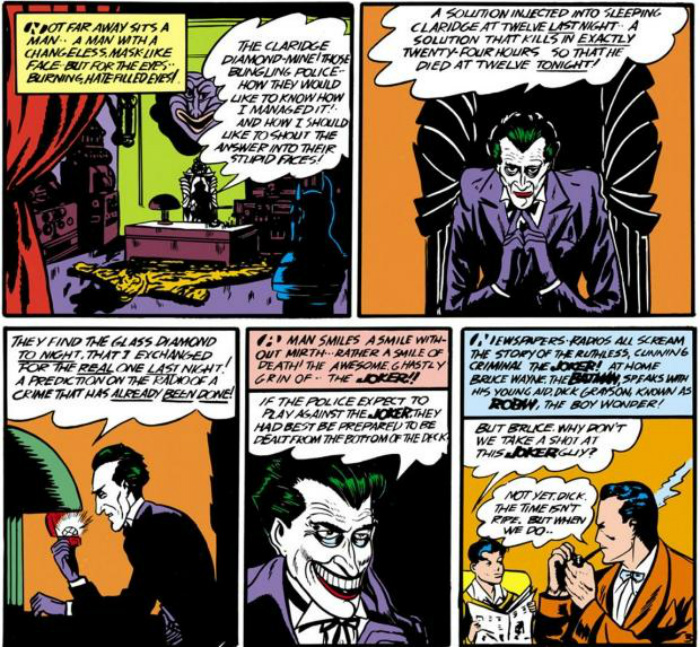
This state of affairs couldn’t last for long, of course. Batman began to consistently interfere in the Joker’s crime sprees, propping up the justice system. The Joker sensed that Batman had to be removed so that he could go about his criminal business.
So his focus began to change, especially in the 1950s and 1960s. The Joker had to cut off the head of the snake and put an end to Batman’s interference in Gotham City. Without Batman’s support, the Joker theorized, the police would not be strong enough to enforce the law. Remove Bat Enemy from the equation, and the Police Enemy would surely fall.
[youtube id=”aDYB10auJI8″ align=”center” mode=”normal” autoplay=”no” maxwidth=”700″]
Eventually, this dynamic began to shift. As the 1970s gave way to the 1980s, the Joker’s battles with Batman became self-justifying. He stopped stealing diamonds and became obsessed with Batman himself, a dynamic nicely portrayed in Frank Miller’s dystopian future-Batman story, The Dark Knight Returns. Batman returns to fighting crime after a ten-year absence, during which the Joker has been a nearly catatonic shadow. At the insane asylum, the TV lights up with news of the Caped Crusader’s return.
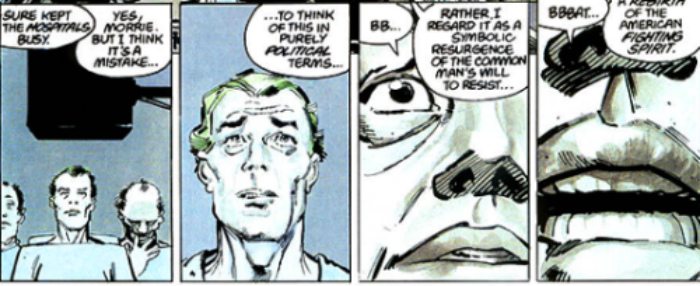
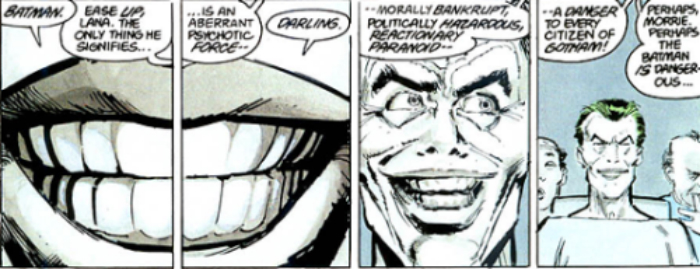
(Frank Miller, of course, would go on to draw more direct parallels between Batman and the West’s war with jihadism, but that clusterfuck is a story for a different day.)
The Joker’s obsession with Batman would grow and grow. In the current comic book mindset, his war with Batman entirely defines his reason for living.
And the Joker’s obsession eventually becomes a two-way street — codependency. After years fighting off attacks of escalating lethality, one terrible traumatizing day changed Batman forever — when the Joker killed Jason Todd, the second Robin, beating him nearly to death with a crowbar and then blowing him up. Of course, readers share some responsibility for this atrocity, as Robin’s fate was decided by a call-in poll.
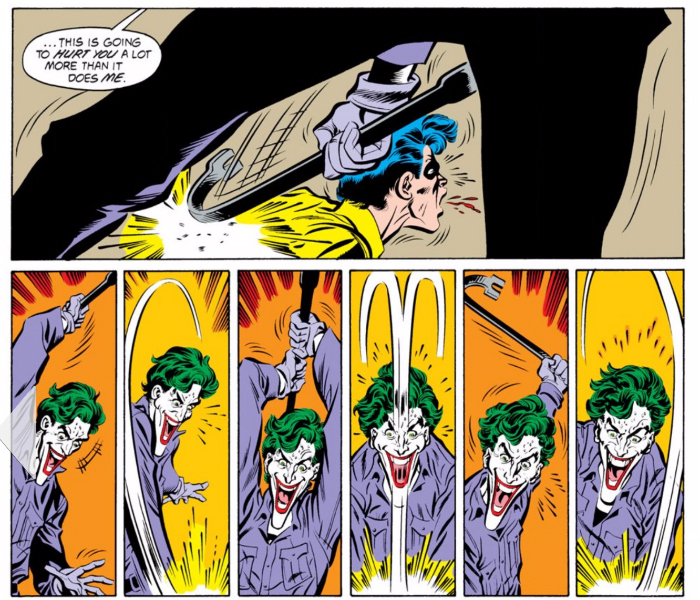
Did I mention the B-plot to this story had the Joker trying to sell a nuclear weapon to terrorists in the Middle East? It was 1988, so the terrorists had a vaguely Hezbollah-ish storyline (don’t look for too much regional authenticity here).
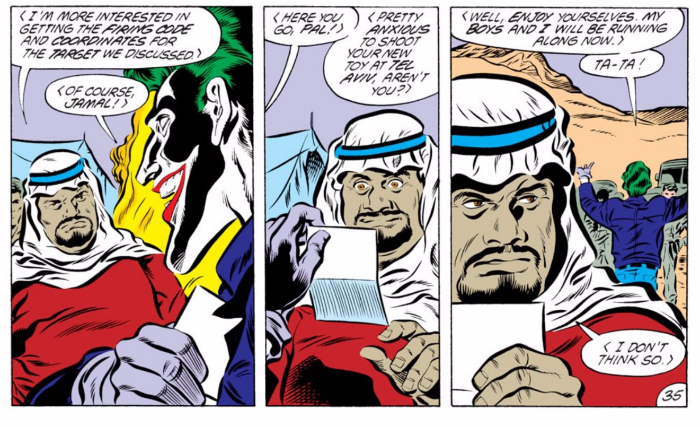
After the death of Robin, Batman went a little crazy. His conflict with the Joker was now intensely personal. As a result, Batman decided to get tough. Enhanced interrogation? Slam a few criminals into walls? Gotta go for a walk on the dark side. Bulk collection of users’ cell phone data? Gotta do what you gotta do.
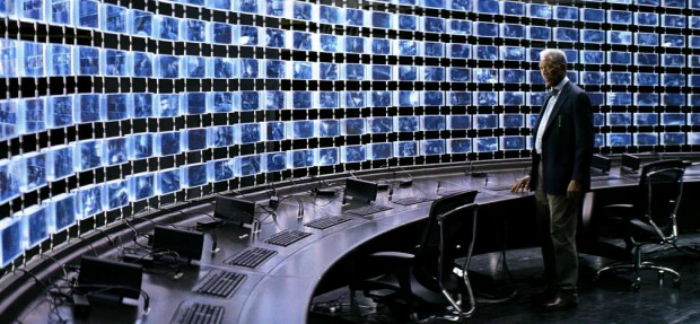
Thus we enter the last stage of the Joker’s relationship with Batman, in which the villain’s most important role is that of moral dilemma.
Christopher Nolan and Heath Ledger didn’t invent this phase, but they embodied it beautifully. In this interpretation, the Islamic State … I mean, the Joker, is a self-described “agent of chaos” whose mission quickly becomes the corruption of the Bat and the pollution of his worldview, through ultraviolence and a series of lose-lose propositions (first, the choice whether to save Harvey or Rachel, the incredible boat scene, the downfall of Harvey Dent).
[youtube id=”xnOLhXmhkyA” align=”center” mode=”normal” autoplay=”no” maxwidth=”700″]
In the film The Dark Knight, of course, Batman vanquishes the Joker’s moral challenge, allowing his personal Patriot Act to expire and, critically, refusing to let the Joker die — leading us to Ledger’s parting thought in the role.
“I think you and I are destined to do this forever.”
[youtube id=”ORFoQHz9EXM” align=”center” mode=”normal” autoplay=”no” maxwidth=”700″]
Then there was that one time Batman and Robin fought the Joker in Baghdad to save the caliphate, but whoops, we’re out of space.
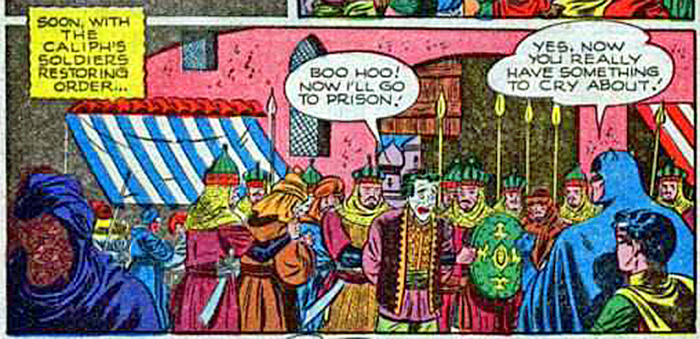
J.M. Berger is co-author of ISIS: The State of Terror and a nonresident fellow at the Brookings Project on U.S. Relations with the Islamic World.
